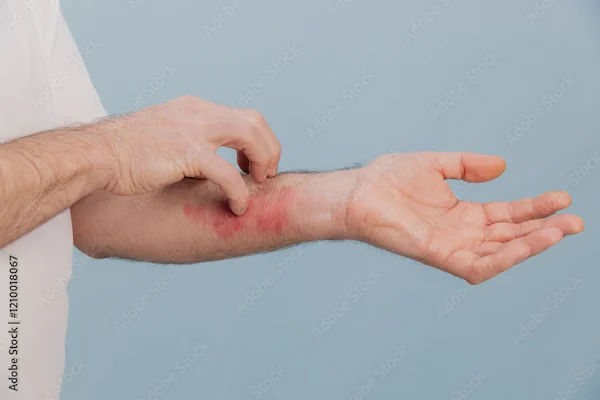Psoriasis in Knees
Understating what Psoriasis is and how it affects knees. Learning about its prospective causes, its types, clinical signs and symptoms and promising treatment and prevention options.

Written by Dr Sonia Bhatt
Last updated on 3rd Jul, 2025
Psoriasis is an immune system disorder that causes skin cells to multiply more rapidly than normal, leading to the development of thick, scaly plaques. These plaques commonly appear on the elbows, knees, face, back, palms, and feet.
In some cases, psoriasis can lead to psoriatic arthritis (PsA), a condition that causes painful inflammation in the joints or where tendons and ligaments connect to bones. It usually affects the knees and other joints, causing swelling, stiffness, and discomfort.
Types of Knee Psoriasis
Psoriasis includes five different types that can cause rashes on the skin, with two types commonly affecting the knees. Psoriatic arthritis (PsA) can also involve the knees, leading to pain and swelling.
1. Plaque Psoriasis
It is the most common type and appears as patches of red, purple, or violet skin with silvery-white or gray scales, depending on skin tone. These patches typically develop on the elbows, knees, torso, scalp, and face.
2. Pustular Psoriasis
It is marked by red or brown patches of skin covered with pus-filled bumps. While it usually affects the hands and feet, a rare form can spread across the entire body.
Symptoms of Psoriasis of The Knees
Psoriasis patches can differ in appearance from person to person, but they tend to share certain common traits. When psoriasis affects the knees, it may cause:
Thickened skin: Patches of red, purple, or violet skin with silvery-white or gray scales, depending on skin tone.
Itching or burning: The affected areas often feel itchy, irritated, or even painful.
Dryness or cracking: The skin may become excessively dry, leading to cracks that can sometimes bleed.
A cyclical pattern of flare-ups and remissions is generally observed. During a flare-up, symptoms become more pronounced, with new patches developing or existing ones worsening. These active periods may alternate with phases of remission, where symptoms improve significantly or disappear entirely for a time.
Consult Top Doctors For Psoriasis in Knees
Causes of Knee Psoriasis
The underlying cause of this immune system dysfunction is not fully understood, but researchers believe it stems from a combination of genetic predisposition and environmental triggers. Many individuals with psoriasis have a family history of the condition, indicating a strong genetic link. However, having a genetic predisposition does not guarantee someone will develop psoriasis. Instead, certain environmental and lifestyle factors often act as triggers.
1. Infections: Certain infections, such as strep throat, are known to trigger or worsen psoriasis. HIV and other immune-related conditions may also exacerbate symptoms by altering the immune response.
2. Medications: Some medications can trigger the onset of psoriasis or lead to flare-ups. These include:
Beta-blockers (used for heart disease and hypertension)
Lithium (used for mental health conditions like bipolar disorder)
Antimalarial drugs, such as hydroxychloroquine
Certain nonsteroidal anti-inflammatory drugs (NSAIDs)
3. Smoking: Smoking has been strongly associated with the development and worsening of psoriasis. It may influence the immune system and increase inflammation, which can lead to more severe symptoms.
4. Obesity: Excess body weight can contribute to psoriasis by promoting chronic low-grade inflammation throughout the body. Additionally, skin folds in overweight individuals can become a breeding ground for irritation and plaque development.
Other Potential Triggers:
Emotional or physical stress, which can disrupt the immune system and lead to flare-ups.
Skin injuries, such as cuts, scrapes, or sunburns, which may cause new patches to form in a phenomenon known as the Koebner effect.
Weather changes, particularly cold, dry climates that can dry out the skin and worsen symptoms.
How Is Psoriasis in The Knees Diagnosed?
The diagnostic process involves a thorough examination of overall symptoms along with medical history to help differentiate psoriasis from other similar conditions.
The healthcare provider may ask questions such as:
When did your symptoms first appear? To understand the timeline of symptoms which can help to determine patterns and potential triggers.
Do you have any family history of psoriasis? A genetic link is common, so identifying affected relatives can provide valuable insight.
Are you experiencing joint pain or tenderness? This question helps screen for psoriatic arthritis.
In some cases, a skin biopsy may be performed to confirm the diagnosis by examining the skin cells under a microscope.
What Are The Treatment and Management Options For Psoriasis in Knees?
While there is no cure for psoriasis, a variety of treatments can help control symptoms, reduce flare-ups, and improve the quality of life depending on the type and severity of disease. A treatment plan is tailored to the individual, taking into account the severity of the condition, overall health, and any medications currently being used.
1. Topical Therapies
Topical treatments are the first line treatment for mild to moderate psoriasis. It is used directly to the skin to reduce inflammation, itching, and scaling. Options include:
Corticosteroids: Reduce inflammation and slow skin cell production.
Vitamin D Analogues (e.g., Calcipotriol): Normalize skin cell growth.
Topical Retinoids (e.g., Tazarotene): Slow excessive skin cell turnover.
Salicylic Acid: Softens and removes scales, enhancing treatment absorption.
Coal Tar & Anthralin: Reduce scaling and inflammation but can irritate and stain.
2. Systemic Medications
For moderate to severe psoriasis or psoriatic arthritis, systemic treatments affect the whole body:
Methotrexate & Cyclosporine: Immunosuppressant that controls severe psoriasis but requires monitoring.
Apremilast: An oral medication that regulates inflammation.
Biologics: Injectable targeting specific immune system components to reduce inflammation.
TYK2 Inhibitors: New oral medications targeting psoriasis pathways.
3. Phototherapy
It uses UV light in a controlled manner which further slows skin cell production and decreases inflammation.
How Can I Prevent Psoriasis in The Knees?
In addition to medical treatments, skin care, diet, and lifestyle factors can play an important role in managing knee psoriasis. Small changes in daily routines can help reduce flare-ups, improve skin condition, and alleviate discomfort.
1. Moisturise After Bathing
Applying emollients like Vaseline or Aquaphor after bathing to retain moisture, prevent skin cracks, and reduce scaling.
2. Use an Exfoliating Ingredient
Cleansers with salicylic acid soften and remove scales.
3. Try Aloe Vera
Aloe vera’s soothing and anti-inflammatory properties help relieve redness, scaling, and itching.
4. Consider Oregon Grape (Mahonia aquifolium)
It has anti-inflammatory and antimicrobial properties that may reduce psoriasis symptoms.
5. Spray Apple Cider Vinegar
Apple cider vinegar can help relieve itching and inflammation while softening scales, but use cautiously to avoid irritation.
6. Follow a Healthful Diet
Avoid inflammatory foods (e.g., red meat, processed foods) and add anti-inflammatory foods like turmeric and omega-3 fatty acids (found in fish, flaxseeds, and walnuts).
7. Manage Stress
Stress can trigger flare-ups, so stress-reducing activities like meditation, yoga, or exercise can help manage symptoms.
Conclusion
The rapid skin cell turnover in psoriasis results in thick, scaly patches extending beyond the skin to affect the joints, a condition known as psoriatic arthritis. It can develop on the knees and, in rarer cases, on the backs of the knees, causing discomfort and skin changes. The severity of the outbreak and the type of psoriasis determine the most appropriate treatment approach. Early diagnosis and treatment are essential for managing symptoms effectively and preventing complications, such as joint damage in cases of psoriatic arthritis.
A healthcare provider, such as a dermatologist or rheumatologist, can assess your condition, recommend effective treatments, and help you manage symptoms more effectively.
Consult Top Dermatologist
Consult Top Dermatologist
Dr. Kavitha Killaparthy
Dermatologist
23 Years • MBBS,DIPLOMA(DERMATOLOGY,VENEREOLOGY,LEPROSY)
Hyderabad
JDS Skin & Hair Clinic, Hyderabad
Dr.j Girishma
Dermatologist
6 Years • MBBS MD DERMATOLOGY
Bengaluru
Apollo Medical Center, Marathahalli, Bengaluru
Dr. Mayuri Jain
Dermatologist
11 Years • MBBS, MD Dermatology , Venereology & Leprosy
Delhi
Dr Mayuri Jain Clinic, Delhi

Dr. H R Yogeesh
Dermatologist
20 Years • MBBS, MD (Dermatology, Venereology & Leprosy)
Bengaluru
Akshata skin and hair care, Bengaluru

Dr Ekansh Shekhar
Dermatologist
10 Years • MBBS MD
Lucknow
Apollo Clinic Hazratganj, Lucknow
Consult Top Doctors For Psoriasis in Knees
Dr. Kavitha Killaparthy
Dermatologist
23 Years • MBBS,DIPLOMA(DERMATOLOGY,VENEREOLOGY,LEPROSY)
Hyderabad
JDS Skin & Hair Clinic, Hyderabad
Dr.j Girishma
Dermatologist
6 Years • MBBS MD DERMATOLOGY
Bengaluru
Apollo Medical Center, Marathahalli, Bengaluru
Dr. Mayuri Jain
Dermatologist
11 Years • MBBS, MD Dermatology , Venereology & Leprosy
Delhi
Dr Mayuri Jain Clinic, Delhi

Dr. H R Yogeesh
Dermatologist
20 Years • MBBS, MD (Dermatology, Venereology & Leprosy)
Bengaluru
Akshata skin and hair care, Bengaluru

Dr Ekansh Shekhar
Dermatologist
10 Years • MBBS MD
Lucknow
Apollo Clinic Hazratganj, Lucknow

